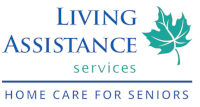Good nutrition is a significant key to living a healthy life and this is even more important for older adults.
We should encourage our loved ones to make healthier choices. This is not easy as older adults have a tendency to be set in their ways and resist change. Offer your loved ones a variety of foods from each of the four food groups – fruits and vegetables, grains, dairy or alternatives and meat or alternatives. Try replacing one food at a time so as not to overwhelm them.
Whole grain bread, for example, is a better choice than white bread.
The food we eat should provide nourishment and sustenance and not just empty calories.
“An apple a day will keep the doctor away” is a well-known expression but clearly it has not been demonstrated to be true. Fruits and vegetables in combination with a balance diet have been proven to be beneficial to good overall health. Canada’s Food Guide recommends a minimum of 7 servings per day for adults 51 years of age and over. Small portions left in containers in the refrigerator are more likely to be consumed frequently during the day.
Salt is an essential part of a balanced diet in modest amounts. However, in larger quantities, it is associated with a host of health challenges for older adults. The Heart and Stroke Foundation has indicated that 80% of the salt we consume comes from processed or fast foods. The good news is that reducing salt intake can lower your blood pressure and the risk of diseases. Your loved ones would benefit from home cooked meals that can be frozen and stored for easy access when required.
Drink water! The importance of staying hydrated is often preached by doctors and other health experts.
This is particularly important for seniors who are more prone to de-hydration than younger Canadians.
Aging affects the thirst mechanism in the body and several hours may pass before feeling the need to hydrate. Once symptoms such as dizziness or light-headedness are experienced, one is already severely dehydrated. Loved ones should be encouraged to keep a bottle nearby which can be re-filled as soon as it becomes empty.
Avoid caffeine and alcohol. They have been determined to increase blood pressure, heart rate and in some cases, cause heart palpitations and an irregular heartbeat. Caffeine can also result in headaches, jitteriness, agitation, stomach problems and abnormal breathing. In combination with a large meal just before bed-time, these stimulants cause restlessness and poor sleep.
Try to encourage your loved ones to eat a well-balanced diet. You can call Living Assistance Services at 416-483-0070 or ask your doctor about the benefits of good nutrition for older adults.

